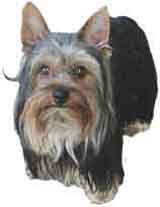Small Dog BreedsInformation About The Yorkeshire Dog Breed |
|
|
The Yorkshire Terrier competes with the Chihuahua for the title of the world's smallest dog. He has a very small compact body and a long silky coat. Though developed from terrier bloodlines, this intelligent petite breed is less active and robust than his larger terrier cousins. He is healthy, fearless, and a good watchdog. He is affectionate to his owner, initially shy with strangers, and prefers not to be petted by those he does not know. He needs consistent and patient training along with early socialization to prevent a tendency toward timidity. This breed has been described as a big dog inhabiting a small dog's body. He can be a barker, a very difficult toy dog to housebreak, and is inclined to dig if left alone in a yard. This dog is sensitive to extremes of temperatures and may need a sweater on cold days. Size: The Yorkshire Terrier stands between 7-9in at the shoulder and weighs between 4-7lb. History and origin: The Yorkshire Terrier was developed in England and Scotland in the 19 th century and was used by working people as a ratter. His appearance is very similar to the Australian (or Sydney) Silky Terrier and is believed to have been evolved through the crossing of the Skye Terrier with the old Black and Tan Terrier. It has also been rumored that the Maltese Terrier and the Dandie Dinmont Terrier may also have contributed to producing this tiny breed. Feeding: Just like other toy breeds, the Yorkshire Terrier requires 4 meals during puppy hood, which is reduced to 1 meal once he turns 1 year old. Recommended feeding is ½ can of high quality dog food or the meat equivalent (about 7-8oz) lightly cooked and supplemented with biscuits. Lean meat scraps and bones are also appreciated, but no chicken bones. Exercise: An apartment is adequate for this breed that only needs minimal exercise to remain healthy and happy. Health care: The Yorkshire Terrier has strong terrier-type teeth that should be scaled by a vet at regular intervals. This breed tends to lose his teeth at an early age, sometimes as early as 3 years of age. Avoid feeding him tidbits to preserve his teeth for as long as possible. Grooming: The Yorkie has a long, silky shedding coat that mats easily and must be brushed and combed daily. He needs an occasional trim and can be kept in a shorter pet clip for a lesser maintenance.Back to the Small Dog Breed page
| |
|
Related News About Dogs ' ); // get rid of newsfeed display by carp CarpConf('poweredby',''); CarpCacheShow('http://www.small-dog-info.com/support-files/rss.xml'); ?>
|
|
|
|
|
|
Copyright © 2006-2007 dogguidance.com |


